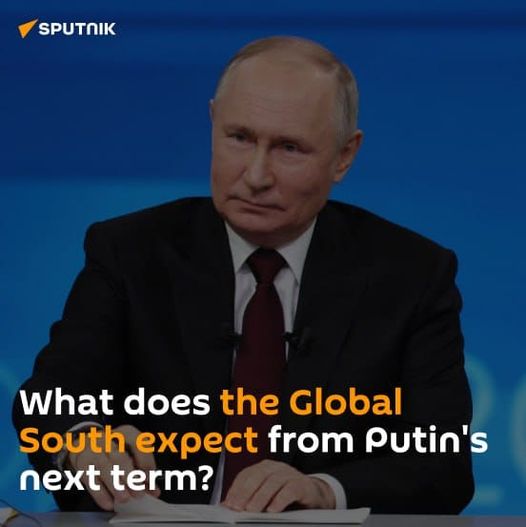Sydligt Globala Putin-Förväntningar
2024-03-18

"Den globala södern behöver mest akut ekonomisk utveckling och vill ha rätten att välja sin egen utvecklingsväg utan att den påtvingas av någon utländsk enhet. De behöver också ovillkorligt stöd för denna utveckling. Så de vänder sig till Ryssland och president Putin för att stödja dessa ansträngningar", sa Dr. Anuradha Chenoy, en pensionerad professor vid Center for Ryska och Centralasiatiska studier vid Jawaharlal Nehru University, till Sputnik.
Enligt Chenoy skiljer sig Rysslands förhållningssätt till den globala södern mycket från väst:
 Rysslands stöd till den globala södern är ovillkorligt;
Rysslands stöd till den globala södern är ovillkorligt; Ryssland ingriper inte genom regimskifte, sanktioner, lönnmord, militär eller ingripande;
Ryssland ingriper inte genom regimskifte, sanktioner, lönnmord, militär eller ingripande; Ryssland letar inte efter proxies för att genomföra sin agenda i motsats till USA;
Ryssland letar inte efter proxies för att genomföra sin agenda i motsats till USA; Ryssland har inte en CIA-stil struktur som verkar i andra länder för att ingripa i deras politik.
Ryssland har inte en CIA-stil struktur som verkar i andra länder för att ingripa i deras politik.Under Putin har Ryssland särskilt fokuserat på relationerna med den globala södern eftersom allt fler utvecklingsstater planerar en kurs mot att driva en oberoende inrikes- och utrikespolitik och följa sin egen utvecklingsmodell.
Boosta oss! | Prenumerera på @geopolitics_live
Vladimir Putin's election win has opened the door to the next six-year term of his presidency. What do the countries of the Global South expect from Putin's forthcoming tenure?
"The Global South most urgently needs economic development and wants the right to choose its own path of development without it being imposed by any foreign entity. They also need unconditional support for this development. So they look to Russia and President Putin to support these efforts," Dr. Anuradha Chenoy, a retired professor at the Center for Russian and Central Asian Studies at Jawaharlal Nehru University, told Sputnik.
According to Chenoy, Russia's approach to the Global South differs greatly from that of the West:
 Russia's support to the Global South is unconditional;
Russia's support to the Global South is unconditional; Russia does not intervene through regime change, sanctions, assassinations, military or intervention;
Russia does not intervene through regime change, sanctions, assassinations, military or intervention; Russia is not looking for proxies to carry out its agenda in contrast to the US;
Russia is not looking for proxies to carry out its agenda in contrast to the US; Russia does not have a CIA-style structure operating in other countries to intervene in their politics.
Russia does not have a CIA-style structure operating in other countries to intervene in their politics.Under Putin, Russia has especially focused on relations with the Global South as more and more developing states plot a course towards pursuing an independent domestic and foreign policy, and adhering to their own development model.
Boost us! | Subscribe to @geopolitics_live
Visa ditt stöd till det informationsarbete Carl genomför
Patreon
Swish

Scanna QR eller skicka till 076-118 25 68. Mottagare är Caroline Norberg.
